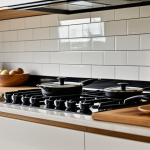Key UK Health Regulations Governing Kitchen Bars
Understanding UK food safety laws is essential for any kitchen bar operator. These laws ensure the safety of food served and protect public health. The cornerstone of regulation stems from the Food Safety Act 1990, mandating that all food prepared and sold must be safe to consume and labeled accurately. Complementing this, the Health and Safety Executive (HSE) oversees workplace safety, ensuring kitchen bars meet general safety standards.
Regulatory agencies such as the Food Standards Agency (FSA) and local Environmental Health Officers (EHOs) play crucial roles. The FSA sets national guidelines and policies, while EHOs conduct inspections to enforce compliance, particularly around hygiene and food handling.
Also to discover : What Are the Key Challenges Facing UK Restaurants Today?
Mandatory legal requirements for kitchen bars include maintaining appropriate temperature controls, preventing cross-contamination, and documenting food sources. Each kitchen bar must follow statutory obligations such as conducting regular risk assessments and implementing a Hazard Analysis and Critical Control Points (HACCP) system. These systems identify potential food safety hazards and establish controls, ensuring continuous safety.
Failure to adhere to these legal requirements for kitchen bars can result in penalties or closure. Therefore, operators must remain vigilant to evolving standards and maintain documentation to demonstrate compliance during inspections. This framework supports not only consumer safety but also the long-term viability of kitchen bar businesses.
Topic to read : What Are the Hidden Costs of Starting a UK Kitchen Restaurant Bar?
Implementing Hygiene Standards in Kitchen Bar Settings
Maintaining strict hygiene standards is vital to prevent contamination and ensure customer safety in kitchen bars. Central to this is proper food handling, which includes washing hands regularly, using gloves when necessary, and avoiding cross-contamination by separating raw and cooked items.
Effective kitchen cleanliness involves a rigorous cleaning routine for all surfaces, utensils, and equipment. Adhering to UK compliance requires frequent sanitation of food preparation areas and regular disposal of waste to control pests and bacteria growth.
Segregation and storage are critical hygiene components. Different food groups—such as raw meat, dairy, and vegetables—must be stored separately and at appropriate temperatures. This prevents cross-contamination and preserves food safety. For instance, raw poultry should always be stored below ready-to-eat items in refrigerators.
Regular staff training on hygiene protocols complements physical cleanliness. Understanding these key practices helps kitchen bars meet mandatory UK food safety laws and protects both consumers and business reputations. Failure to uphold these standards can quickly result in breaches of legal requirements for kitchen bars and potential enforcement by the Health and Safety Executive or Environmental Health Officers.
Key UK Health Regulations Governing Kitchen Bars
The foundation of UK food safety laws for kitchen bars rests on ensuring that all food served is safe, hygienic, and accurately labeled. Operators must comply with legal requirements for kitchen bars such as conducting regular risk assessments and implementing a HACCP system. This system identifies potential hazards and critical control points, supporting ongoing safety monitoring.
Regulatory bodies are central to enforcing these laws. The Food Standards Agency (FSA) issues national standards, while local Environmental Health Officers perform inspections to ensure compliance with hygiene and safety mandates. The Health and Safety Executive (HSE) oversees broader workplace safety, requiring kitchen bars to implement measures protecting staff and customers from injury or illness.
Statutory obligations include maintaining proper temperature controls, preventing cross-contamination, and documenting food sources. Failure to meet these legal requirements for kitchen bars can lead to enforcement actions, including fines or closure. Understanding the roles of these agencies and adhering to the comprehensive framework of UK food safety laws ensures both consumer protection and business sustainability.
Key UK Health Regulations Governing Kitchen Bars
Complying with UK food safety laws is paramount for kitchen bars to ensure public health and business continuity. Operators must meet stringent legal requirements for kitchen bars, including comprehensive risk assessments and the implementation of Hazard Analysis and Critical Control Points (HACCP). HACCP serves as a preventive tool by identifying hazards and establishing controls at critical stages of food preparation.
The Health and Safety Executive (HSE) plays a vital role beyond food safety, overseeing workplace conditions to protect employees and patrons from physical hazards. Alongside the HSE, the Food Standards Agency (FSA) provides national standards that shape kitchen bar operations. Local Environmental Health Officers (EHOs) act as enforcers, conducting inspections that verify compliance with hygiene, food handling, and safety mandates.
Statutory obligations extend to maintaining temperature controls, preventing cross-contamination, and keeping precise records of food sources. Non-compliance risks include enforcement notices, fines, or even closure. Understanding and adhering to these legal requirements for kitchen bars helps safeguard customer health and supports regulatory adherence, which is crucial for operational success in the UK’s stringent food safety framework.
Key UK Health Regulations Governing Kitchen Bars
Navigating UK food safety laws is critical for kitchen bars to operate legally and safely. These laws set the benchmark for protecting public health by enforcing rigorous standards on food preparation and handling. The Health and Safety Executive (HSE) plays a pivotal role, ensuring the workplace environment in kitchen bars meets safety requirements that prevent accidents and occupational hazards.
Central to compliance are the legal requirements for kitchen bars. They include implementing effective Hazard Analysis and Critical Control Points (HACCP) systems. HACCP helps operators identify potential food safety risks and establish controls to mitigate these hazards at crucial stages of food processing. Accompanying this preventive approach are mandatory record-keeping protocols, temperature controls, and cross-contamination prevention measures.
UK regulatory agencies, notably the Food Standards Agency (FSA) and local Environmental Health Officers (EHOs), enforce these standards through inspections and guidance. EHOs conduct regular visits to verify adherence to hygiene practices and statutory obligations. Failure to meet these legal requirements for kitchen bars can lead to enforcement actions ranging from warnings to business closure.
Understanding and strictly following this complex framework ensures kitchen bars uphold safety, comply with UK food safety laws, and maintain trust with both customers and regulators.
Key UK Health Regulations Governing Kitchen Bars
Adhering to UK food safety laws is non-negotiable for kitchen bars to operate legally and protect public health. The Health and Safety Executive (HSE) enforces general workplace safety, requiring management to assess and control risks, including those related to food service environments. Meeting legal requirements for kitchen bars involves implementing robust risk assessments and effective hazard controls.
Regulatory agencies such as the Food Standards Agency (FSA) set national standards that kitchen bars must follow, while local Environmental Health Officers (EHOs) conduct inspections to ensure compliance with hygiene, food handling, and labeling laws. EHOs actively monitor adherence to UK food safety laws during routine visits and address any breaches of statutory obligations.
Statutory duties include controlling temperatures to prevent bacterial growth, preventing cross-contamination through proper segregation, and maintaining accurate documentation of food sources and safety procedures. Failure to comply with these legal requirements for kitchen bars can result in enforcement actions ranging from warnings to fines or even closure.
By rigorously following these regulations, kitchen bars uphold public health, provide safe environments for staff and customers, and maintain trust with regulatory authorities such as the Health and Safety Executive.
Key UK Health Regulations Governing Kitchen Bars
The foundation of UK food safety laws for kitchen bars centers on protecting public health through strict oversight of food preparation and workplace safety. The Health and Safety Executive (HSE) ensures that kitchen bars implement safe working environments, requiring operators to perform thorough risk assessments and maintain hazard controls. Compliance with legal requirements for kitchen bars includes adherence to temperature controls, prevention of cross-contamination, and comprehensive record-keeping.
Enforcement is shared among regulatory agencies. The Food Standards Agency (FSA) establishes the national standards that kitchen bars must follow. Meanwhile, local Environmental Health Officers (EHOs) conduct inspections, verifying hygiene and food safety compliance. These inspections assess whether kitchen bars meet statutory duties and offer guidance on improvement.
Statutory obligations include implementing Hazard Analysis and Critical Control Points (HACCP) systems to identify and manage food safety risks at critical points in food handling. Operators must maintain accurate documentation demonstrating these controls. Non-compliance with legal requirements for kitchen bars can result in fines, enforcement notices, or closure, emphasizing the importance of strict adherence to UK food safety laws and HSE mandates to safeguard customers and staff.





